CLOCK TICKING


What recent U.N. climate report means for Louisiana.
Read on page 2

LSUReveille.com
@lsureveille



What recent U.N. climate report means for Louisiana.
Read on page 2

LSUReveille.com
@lsureveille
B-16 Hodges Hall
Louisiana State University Baton Rouge, La. 70803

NEWSROOM (225) 578-4811
Editor-in-Chief JOSH ARCHOTE
Digital Managing Editor HANNAH MICHEL HANKS
Digital Editor JAYDEN NGUYEN
News Editor CLAIRE SULLIVAN
Deputy News Editor GABBY JIMENEZ
Sports Editor PETER RAUTERKUS
Deputy Sports Editor MACKAY SUIRE
Entertainment Editor WILL NICKEL
Opinion Editor JOHN BUZBEE
Multimedia Editor MATTHEW PERSCHALL
Production Editor MADISON COOPER
Chief Designer EMMA DUHE
BY OLIVER BUTCHER @OliverButcher73A United Nations panel released its sixth assessment report on climate change in March, a culmination of years of research and the efforts of hundreds of scientists.
The full 85-page report can be read online at the Intergovernmental Panel on Climate Change website, but the main takeaways are consistent with what most of the world’s scientists have been saying for years now: The Earth is warming because of human activity.
“Human activities, principally through emissions of greenhouse gasses, have unequivocally caused global warming, with global surface temperature reaching 1.1°C above 1850–1900 in 2011–2020,” the report reads.
The panel has stressed the importance of remaining below 1.5°C of warming above pre-industrial levels to avoid the most devastating impacts of climate change.
Now just 0.4°C from that marker, the panel reported the ways in which “human-caused climate change is already affecting many weather and climate extremes in every region across the globe.”
The panel reports with a level of “very high confidence” that “there is a rapidly closing window of opportunity to secure a livable and sustainable future for all.”
For coastal communities like
those in southern Louisiana, that warning is dire.
Louisiana’s climate vulnerability
The effects of climate change have already been felt in Louisiana, especially along the coast.
Louisiana has lost 2,000 square miles of land—a mass the size of Delaware—from the coast since the 1930s. Rising seas are one factor that worsen that creeping coastline.
“Louisiana’s coast has two problems: One is sea level rise caused by climate change, and one is the sinking of Louisiana’s coast caused by a number of other factors, the most notable of which is the leveeing of the Mississippi River,” said Brian Snyder, an associate professor in LSU’s department of environmental sciences. “The Mississippi River didn’t used to have levees. We built those levees to keep the river from flooding, and when we did that, it reduced the amount of sediment that gets input to the marshes, so those marshes are eroding and sinking.”
The future without action is alarming for south Louisiana.
“In most of the scenarios that I’ve seen, the worst-case scenario is the ocean being right around the Baton Rouge and Ascension Parish border,” Snyder said. That would turn Baton Rouge into a coastal city and anything south of it all but unlivable.
Louisiana’s coast could rise over 4 feet by 2100, according to a 2022 report from the National
Oceanic and Atmospheric Administration and NASA.
But Louisiana has a vision to address its land loss problem.
It’s called the Coastal Master Plan, set forth by the Louisiana Coastal Protection and Restoration Authority and approved by the state legislature to counteract the sinking coast.
The most recent edition of the plan calls for $50 billion worth of investment in protecting the coast, and, if successful, could help build back lost land.
However, anything much after 2050 is difficult to determine, for the latter half of the 21st century is when sea levels begin to play a bigger part in the welfare of the coast, and the plan is only working on a 50-year timeframe, stopping its predictions around the year 2060.
“While we do not know exactly how the coast will change in coming decades, the fact is that the coast will certainly be different than it is today, just as it is different now than in the past,” the plan reads. “The master plan’s intent is not to halt or reverse that change, but rather to use advanced tools to anticipate a range of possible future outcomes. These predictions provide a basis for a plan that moves toward more desirable and sustainable outcomes for Louisiana residents, businesses, and our natural coastal resources.”
Extreme weather is another battle Louisiana is fighting on the climate front.
Scientists project climate change will increase the rainfall and wind speeds of hurricanes, according to the National Oceanic and Atmospheric Administration.
That projection is worrying for a state like Louisiana, which in the 2020 and 2021 hurricane seasons saw hundreds of thousands of power outages, billions of dollars in damage and thousands of people displaced from their homes.
What’s humanity’s next step?
Though the world’s scientists issued a dire warning to humanity in the U.N. panel’s latest climate report, they also say that urgent action to protect the future is still in reach.
“Changes in the food sector, electricity, transport, industry, buildings and land-use can reduce greenhouse gas emissions” and make people healthier, the IPCC’s press release read.
The IPCC’s guide for policymakers said that public and private money still flows more toward fossil fuels than climate adaptation and mitigation.
All the technology and solutions needed to reduce greenhouse gas emissions are already available, according to the U.N. panel. But, the scientists say, governments must act with urgency to move toward cleaner energy and away from fossil fuels.

How the world moves forward in addressing rising sea levels will impact billions of people around the world—including those residing along Louisiana’s coast.
ADVERTISING (225) 578-6090

Layout/Ad Design EMILY TRAN
Layout/Ad Design SOFIA RAMOS

The Reveille holds accuracy and objectivity at the highest priority and wants to reassure its readers the reporting and content of the paper meets these standards. This space is reserved to recognize and correct any mistakes that may have been printed in The Daily Reveille. If you would like something corrected or clarified, please contact the editor at (225) 578-4811 or email editor@lsu.edu.
The Reveille is written, edited and produced solely by students of Louisiana State University. The Reveille is an independent entity of the Office of Student Media within the Manship School of Mass Communication. A single issue of The Reveille is free from multiple sites on campus and about 25 sites off campus. To obtain additional copies, please visit the Office of Student Media in B-39 Hodges Hall or email studentmedia@ lsu.edu. The Reveille is published biweekly during the fall, spring and summer semesters, except during holidays and final exams. The Reveille is funded through LSU students’ payments of the Student Media fee.
The International Student Association hosted an International Fusion event in the Student Union Theater on Thursday to promote diversity and understanding of all cultures at LSU through artistic performances.
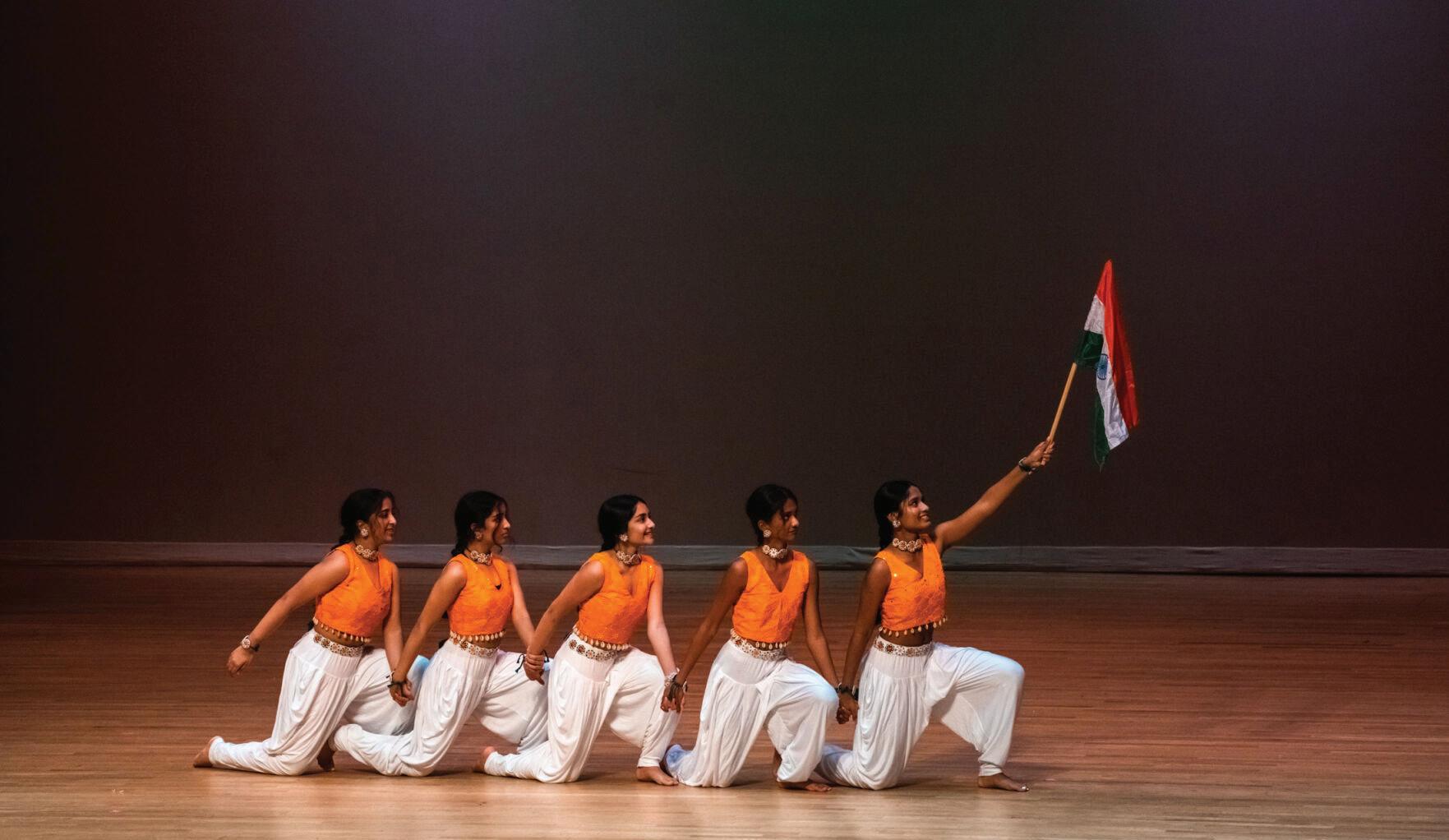
The show featured 13 countries, and performers represented their culture through dances, singing, fashion and live music.
After the performances, a fashion walk highlighted clothing from numerous countries. Participants in different types of attire entertained the crowd with cultural walks and dances. The night concluded with a “Taste of the World” themed buffet to show another important aspect of international cultures.
“We organized the International Fusion where it’s a cultural representation from all different countries including the U.S. … also to create a festival with all people coming together and embracing the diversity at the same place,” said Ritu Ghose, president of ISA.
Fusion has been held since 2001, but this year’s event was the largest ever with 700 people
in attendance, Ghose said. The event was also ISA’s biggest since it became an independent student organization and separated from the International Cultural Center in the fall 2022 semester, Ghose said.
The event hadn’t happened for the past two years, and Ghose said she wanted to change that when she became president of ISA.
“It was one of my goals that I [had] to bring back International Fusion,” Ghose said. “This is
very important to represent the international students at LSU, and it also represents LSU’s diversity.”
When domestic students learn about the cultures of different countries, it helps international students feel like they belong and their traditions are valued, Ghose said. She encourages students to be familiar with the diversity at LSU because it creates a bond between individuals.
ISA aims to create harmony and inclusivity on campus with
events like these, Ghose said.
“I think it’s important for all LSU students to come here [to International Fusion] because if we want to create an environment which is inclusive, where all students from all around the world will feel like they belong here, they need to be a part of these kinds of activities,” Ghose said.
Hailey Carter, a biological sciences freshman, attended International Fusion to see all of the cultures represented at LSU and enjoy their dances and music.
“It gives a lot of insight to the different cultures,” Carter said. “Maybe you grew up in a really small town … so you believe a lot of stereotypes about a lot of cultures. But you come here and see that they are not true.”
Ayushi Patel is a member-atlarge within ISA and a biological sciences senior. Patel said International Fusion is meant to educate people.
“LSU is made up of so many different cultures, and the fusion is where you can get exposure to all of those cultures and the diversity we have here on campus,” Patel said. “So, basically we were trying to intermingle the cultures, showcase the cultures of the world that exist here on
campus.”
Patel believes it’s important for people to broaden their horizons on different cultures.
“I feel like you can only grow as a human being if you know what is out there in the world,” Patel said. “I think the perfect place to do that is these events where you can meet people from all over the world who have unique experiences you probably would never know of. These are our peers, right? They exist on campus, so why not get to know them and know more about the world, too?”
Reynold Hunter, a freshman English major, performed at the event with the Korean-pop club. The club performed dances to Kpop music to help people gain a higher understanding of K-pop culture, Hunter said. Fusion is where people can also learn to respect others, Hunter said.
“At LSU we have such a big international division. Half my friends are not even from America,” Hunter said. “So it’s really important to come to events like this to respect the people you are on campus with, to have a better understanding of where they come from and what they hold dear.”
Stephen Waguespack thinks it’s time for the woke era of higher education to come to an end.
Waguespack, a Republican candidate for governor, is not the only candidate to express such a view.
His GOP competitor Jeff Landry has not been shy, to call out perceived wokeness on college campuses, at times expressing concern that conservative voices are being silenced.
Hunter Lundy, an independent conservative candidate, has likewise raised concerns about “ungodly indoctrination” in schools.
Democratic candidate Shawn Wilson condemned such claims, likening the term “woke” to a dog whistle used to speak negatively about minorities on the sly.
“The stifling of this enlightenment gives me concern because you’re now controlling and limiting the ability to understand history in its context,” Wilson said. “If you don’t study it, you’re bound to repeat it.”
While pontificating about wokeness has come to be expected in campaigns, it’s far from the only higher education topic that will come up ahead of Louisiana’s fall gubernatorial election.
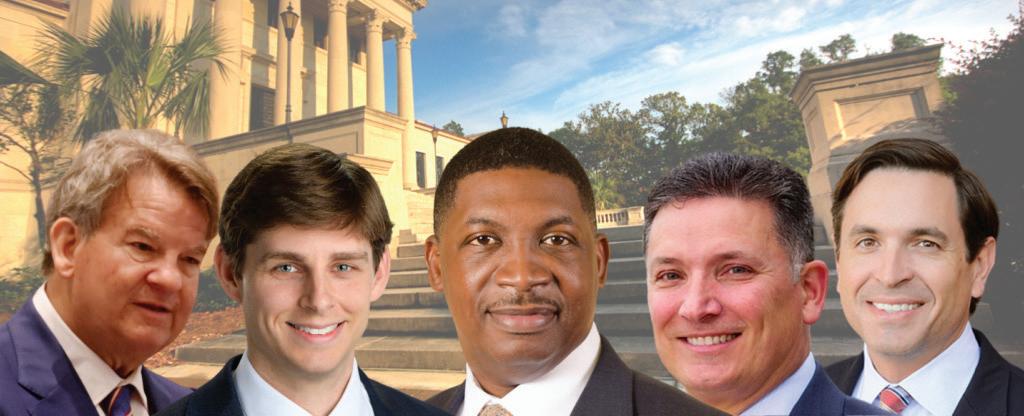
Here’s how the candidates fall on the issues.
Landry and state Sen. Sharon Hewitt, R-Slidell, did not respond
to multiple interview requests for this article.
What do you think is the role of a public university?
“Universities ought to provide some vision for our workforce and our economy as a part of not only the curriculum but the academic excellence that they attract ought to be cutting edge,” said Wilson, the recently retired state transportation secretary. “Clearly universities are designed to contribute to a local economy because they attract new residents. They attract businesses to take advantage of their research potential, and you can’t discount the cultural influence that they play as well in terms of bringing art, entertainment, athletics.”
“The role of a public university should be to equip the young people of our state, first, to take on the issues of the world, the issues of life,” Lundy said, “To educate them, train them, equip them, and get them ready for the profession that they’re called to be.”
Rep. Richard Nelson, R-Mandeville, defined the role of higher education differently.
“I think it’s to educate the population and also give a path for people to provide for their families, to provide a trained workforce for the businesses that are in the area,” Nelson said. “Unfortunately…we create the trained workforce, [and] I think it mostly goes out of state.”
Treasurer John Schroder and
Waguespack offered more general responses to the question.
“Louisiana’s higher education systems and universities will play a critical role in keeping Louisiana’s best and brightest in state,” Schroder said.
“I think all of our institutions of higher learning are there to help turn our young adults into productive workers and citizens of this state,” said Waguespack, former CEO and president of the Louisiana Association of Business and Industry.
How do you feel about tenure for higher education faculty?
Nelson said he believes granting tenure is a widely accepted practice in higher education, and the process should be free of po -
litical influence.
“I think that that’s just kind of a standard practice, and I think [faculty] should be able to speak their mind. I don’t always agree with them, but they should be able to say what they want.”
Wilson called tenure essential for retaining qualified professors over the long haul.
“When you tell an academic, ‘I expect you to come and do research,’ when you’re looking at long term research, it might be six to eight to 10 years before the research is fully fleshed out to become something practical. And so without tenure, you run the risk of losing talent and making investments in other communities and other states as opposed to growing what you have here at the university systems in Louisiana.”
The tenure-granting process needs fine-tuning, according Waguespack, in order to ensure universities are using it effectively.
“I understand that there’s a role to ensure you can attract top faculty around the country. I understand the concept behind it,” he said. “But the way it’s applied sometimes can hold back some of the proper analysis that’s needed for any employee. And so I think it’s how universities apply tenure… I would like to see every university be very strategic in how they grant it and apply it and ensure it’s given us a way to protect
EDUCATION, from page 3
bold and high performing faculty as compared to protecting those that maybe need to be repurposed or retrained.”
Lundy would like to see the tenure process evaluated but wouldn’t say whether he supported or opposed its existence.
“Until I see all the statistics, until I see what the agendas are, then I’ll have an answer,” Lundy said.
Schroder declined to answer this question.
What qualifications will you look for in your higher education appointees?
Schroder said higher education leaders in his administration would need to capable of curtailing the state’s declining enrollments. More students will ultimately lead to lower tuition, he said
“We have a declining student population, and today technology is changing the way students learn,” he said. “My appointments of higher education board members will always be about what is in the best interest of students and campuses.”
Waguespack wants university system board members to bring their expertise to the table.
“You also want the people that have an understanding and the goals of the institution and the needs of the students in that in-

stitution,” he said. “So the qualifications for a board of a flagship university may be different and would be different for those that would go on the board of the community college system.”
Wilson said higher ed leaders should have “a national vision and a national or international role.”
“That appreciation of what academics is today and what it’s becoming,” he said “You want a commissioner and/or leaders of systems that will see what the future looks like and take the steps today to be positioned to be competitive in the future. Clearly, you want people who have a level of academic qualification and competence, as well as meaningful experience.”
State-level academic leaders should have sound training as well as character, according to Lundy.
“A God-fearing person, a person that understands that in order to be a leader you have to be a servant, he said. “So when you take that position, you understand you’re a servant of the state of Louisiana. You’re a servant of higher education, and you’re a servant of young people who are making a way to a life after they get their education.”
Nelson will look specifically for academic leaders backgrounds in science and technology research.
“I think that that is really the path that I would look for to bring
the jobs of the future,” he said. What should be done to improve the quality of higher education in Louisiana?
Waguespack wants a primary focus on student needs.
“If you look at high performing states in the South… it’s quite acceptable for students to go straight to a two-year [college] after [high school] and either use those skills to go to the workforce, or use that education they get and then transfer to a four-year institution…
“I think we need to do a much better job of identifying those kids and showing them the value of starting at a two-year program to either build a career or their continuing education paths.”
Schroder wants Louisiana colleges and universities to establish business incubators on campus in order to spark innovation. Students could receive grants to support feasible business ideas if they locate in state, he said.
Lundy opposes lowering standards to bolster enrollment, and he said partnerships between technical colleges and private industry should be emphasized.
“We should not be lowering our standards to accommodate numbers. We should keep our standards high,” Lundy said, “and we should assure that there’s an equal opportunity for everybody. But our goal should be excellence…”
Wilson believes Louisiana has
academically sound institutions as well as some “cutting edge” program.
“I think sustainable funding is the most important thing that we can do to really build the quality of our universities… There are programs at every institution that are unique to those institutions, and that offers value.”
Nelson said Louisiana could build a healthier ecosystem for higher education through providing state money to attract “toprate, world-class faculty.”
“If you’re able to build those advanced lab facilities and things like that, that will attract them and allow them to do top research that is seen all around the world, and will attract grad students who have been working in those kinds of areas. … It’s spending money the right way.” Should Louisiana’s colleges and governing boards be restructured or reorganized?
Nelson said there are ways that the state could eliminate bureaucracy in higher education governance.
“Some of that runs into the political realities of these things that have been here for a really long time,” he said. “I think anywhere where you have people that aren’t creating the final product, like people who are doing research, people who are teaching kids, those are creating a final product. When you have these multiple lev-
els of bureaucracy that aren’t really doing anything for the people, I think that’s where you can look to cut out some of the fat.”
Wilson was a student member on the predecessor of the University of Louisiana System Board of Directors before state schools were shuffled between the LSU and UL systems.
“Having been a member and having seen some restructuring and creation of a system’s realignment, I don’t know that I am prepared today to tell you that yes, we need to restructure our education,” he said. “I think we have elements of organization that are working effectively, and I think it’s incumbent upon us to give it that opportunity to perform and make tweaks accordingly.”
State leaders should be open to more efficient approaches in higher education, Waguespack said, adding that oversight should stop short of micromanagement.
“I’m always open to figuring out what is that best-in-class model, but I don’t go into this with a preconceived notion,” he said. “I’d want to sit down with local leaders, figure out the roles of each institution, what their goals are. And then at that point, once you know what the strategic plans for each institution is, then you figure out what’s the best governing model to help them get there.”
Lundy and Schroder declined to answer this question.
It’s 10:20 a.m. in Coates Hall, and your class just ended. You’ve got to be at Lockett in 10 minutes, so you set out through the quad. A man with a microphone and a camera approaches you. He asks how attractive you think you are.
Now, on your walk to class, you could be seen by over 71,000 people.
Seth Trotter is a 21-year-old junior entrepreneurship major at LSU, an online content creator and a “public figure,” according to his Instagram bio. He has cultivated a large following on TikTok (71,600 followers), Instagram (8,551 followers) and Facebook (5,300 followers) by posting compilations of short interviews with members of LSU’s student body.
Trotter typically posts once a day. Each video contains four to six interviews and racks up anywhere from 15,000 to 3 million views. His most popular is sitting at 5 million.
Trotter produces content commonly known as “man-onthe street” or, more formally, “Vox pop” videos. This style of content is defined by its interviews with random members of the public. It has a large audi-

ence on TikTok, with the hashtag “man on the street” having over 1.2 billion views.
Trotter says this style of content is popular because people often relate to average members of the public. He cited that relatability as one of the biggest contributing factors to his evergrowing follower counts.
“The more relatable thing, or the more value you’re adding for your potential audience, is going to catch fire,” said Trotter. But what exactly is the content that Trotter has found so much success making? The bulk of it falls into one of three categories:
• “What song are you listening to?” Trotter asks what song you’re listening to, and you share the song you’re currently playing.
• “What would you rate this person?” Trotter shows you a photo and asks you to rate the person in it out of 10. You then rate yourself out of 10 and say whether you think other people will agree.

• “What would you rate this outfit?” This is identical to rating a person, but with outfits.
Many LSU students enjoy this content, but reasons vary from person to person.
Ryan DePriest, a junior politi-
cal communications and history double major, doesn’t regularly view man-on-the-street content but thinks it’s valuable on college campuses. He feels mainstream media doesn’t often reflect the views of the majority. For him, content like Trotter’s is a better representation of how people feel.
“Interviewing college students about their sentiments on things has always been useful,” DePriest said. “It gives a better way to trade public sentiments and see what the true outliers are.”
He also enjoys the sense of community these videos can help create. DePriest said many college students enjoy having their voices heard, and Trotter’s videos can make that happen.
“A lot of people just want to be talked to,” he said.
Emma Van Pelt, a 19-year-old sophomore social work major, has another reason for liking these videos. She often takes song recommendations from the people Trotter interviews and said she appreciates the variety of music that gets talked about.
These videos are more than just the interviews though. Other aspects of a textbook man-onthe-street video include brevity and an attention-grabbing premise. Interviewers need a lot of footage to release consistent video content, which is why students often find Trotter in the quad, ready to film.
Trotter’s interviews are quick. Most last one to two minutes total between the first word spoken and the wave goodbye. Many people only have a second to spare when going about their day, but Trotter says it gives the interactions a “lightning-in-abottle energy.” He said fast interviews also help creators, because they keep people’s attention and multiple of them fit in a single video.
Some students appreciate a concise interview. DePriest was interviewed by Trotter and featured in a video about “the worst female fashion trends.” He described the interaction as fun and overall lighthearted, due in part to the quick turnaround time.
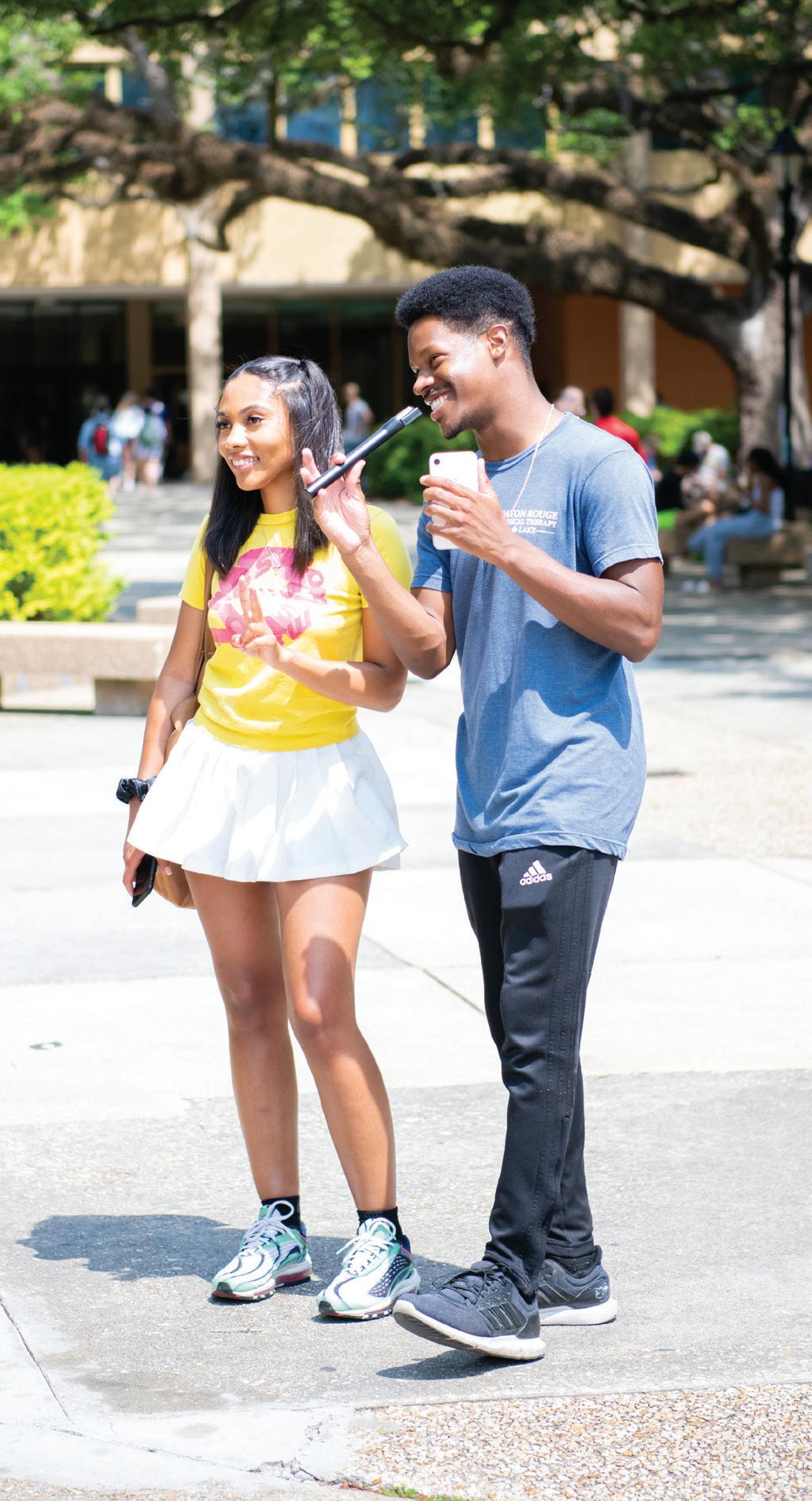
“It was a minute in and out,” said DePriest.
On the other hand, prioritizing speed can lead creators to cut some corners. Trotter usually approaches people before the camera starts rolling to ask if they want to be in a video. He sometimes omits that step in order to catch people off guard, which he feels makes for a more compelling interview.
“I like to catch people’s genuine reactions,” he said.
Many students’ concerns about man-on-the-street videos start here.
Allie Brunet, a junior psychology major at LSU, enjoys man-on-
the-street content and watched it frequently in 2022. Brunet said she would be thrilled to feature in a video but does not think every student shares the sentiment.
“Consent is important when you’re filming people,” she said, “Not everyone wants that.”
Van Pelt agreed, with added concern for how the audience might react.
She said online comment sections often take short clips of people and make assessments about their entire personality. She believes the problem worsens when someone doesn’t want to be filmed or posted in the first place, as commenters often assume a person is rude for ignoring an interviewer.
“Some people just aren’t comfortable with that,” said Van Pelt, “You don’t know anything about them.”
Trotter understands the concerns associated with man-onthe-street videos. He thinks creators too often prioritize getting views over being respectful, which leads them to film or post people without consent. Trotter said he disapproves of that mentality and follows rules to ensure nobody is upset or embarrassed by his content.
One of these rules is never posting a video that someone doesn’t want posted, even if it would perform well.
“There have been a lot of videos I haven’t even put out because people had messaged me previously to not post it, and I wanted to post it so bad because I -knew it was going to do so good,” said Trotter.
He also has rules for posting interviews with people caught off guard. These interviews don’t involve verbal consent, so Trotter uses his own judgments about whether a person is comfortable and willing to participate. According to him, people he deems uncomfortable or unwilling do not get posted.
“Not necessarily a verbal consent, but a smile or a nod,” said Trotter, “Even if they tell me what song they’re listening to, but I see them struggling to give me an answer or thinking of what to say, then I won’t post the video.”
Trotter often relies on his ability to read social cues. As a result, the lines of consent in some interviews can seem blurry.
The last interview in his video posted on March 30 ends with Trotter asking the standard “What song are you listening to?” and being told, “I’m not listening to a song, it’s just quiet so people don’t talk to me” in response. The woman being filmed then walks away.
The woman expressed she didn’t want to be talked to before exiting the situation. Trotter included her in the video and, for comedic effect, played the lyrics “don’t talk to me” from the song
“Punk Monk” by Playboi Carti over her walking away.

Trotter said he did not feel conflicted posting the video because the woman “looked like she was smiling” as she approached him. He also cited that perceived smile as his reason for not following up with her after the interview to obtain concrete approval.
Many students are also concerned that Trotter’s content could negatively impact some people’s self-image. Most videos center around students making positive or negative judgments about the appearances of other students. Those judgments are then posted to a social media platform, where hundreds of thousands of people can join the judging.
Van Pelt dislikes the culture created by rating TikToks, because they turn looks and outfits into defining traits. She said focusing on these surface-level qualities can lead people to feel anxious about being seen in public.
“On social media, the responses to what people look like can be really stressful. You feel like you always have to look super put together because people are always judging you,” she said.
Van Pelt also feels social media too often encourages creators to lean into negativity. The most liked comments on many videos are often negative and posting interviews where people are awkward or look bad is a way to get more engagement, even if it’s from people being mean, she said.
“70,000 people agreeing, disagreeing, debating on whether you’re hot or not – it’s dehumanizing,” said Van Pelt.




DePriest also questioned the effect that a “rate this person” TikTok could have on someone’s self-image.

“You say ‘I’m a 10,’ and 500,000 people say you’re not. That can’t feel good,” said DePriest.
Trotter thinks his TikToks have a positive effect on everyone involved. He believes a low rating can be good, especially for someone rating themselves highly, because it brings them down to everyone else’s level.
“It knocks them down to humbleness,” he said, “You’re on the same level playing field as everyone else.”
Trotter said people shouldn’t put too much personal stake in the ratings. He said they only represent your attractiveness to another individual, not your worth as a person.
“First appearances, I think, are everything,” said Trotter, “but it’s not so much about that. It’s more that if you see a person, yeah you’re going to judge them, but don’t judge their abilities or who they are.”
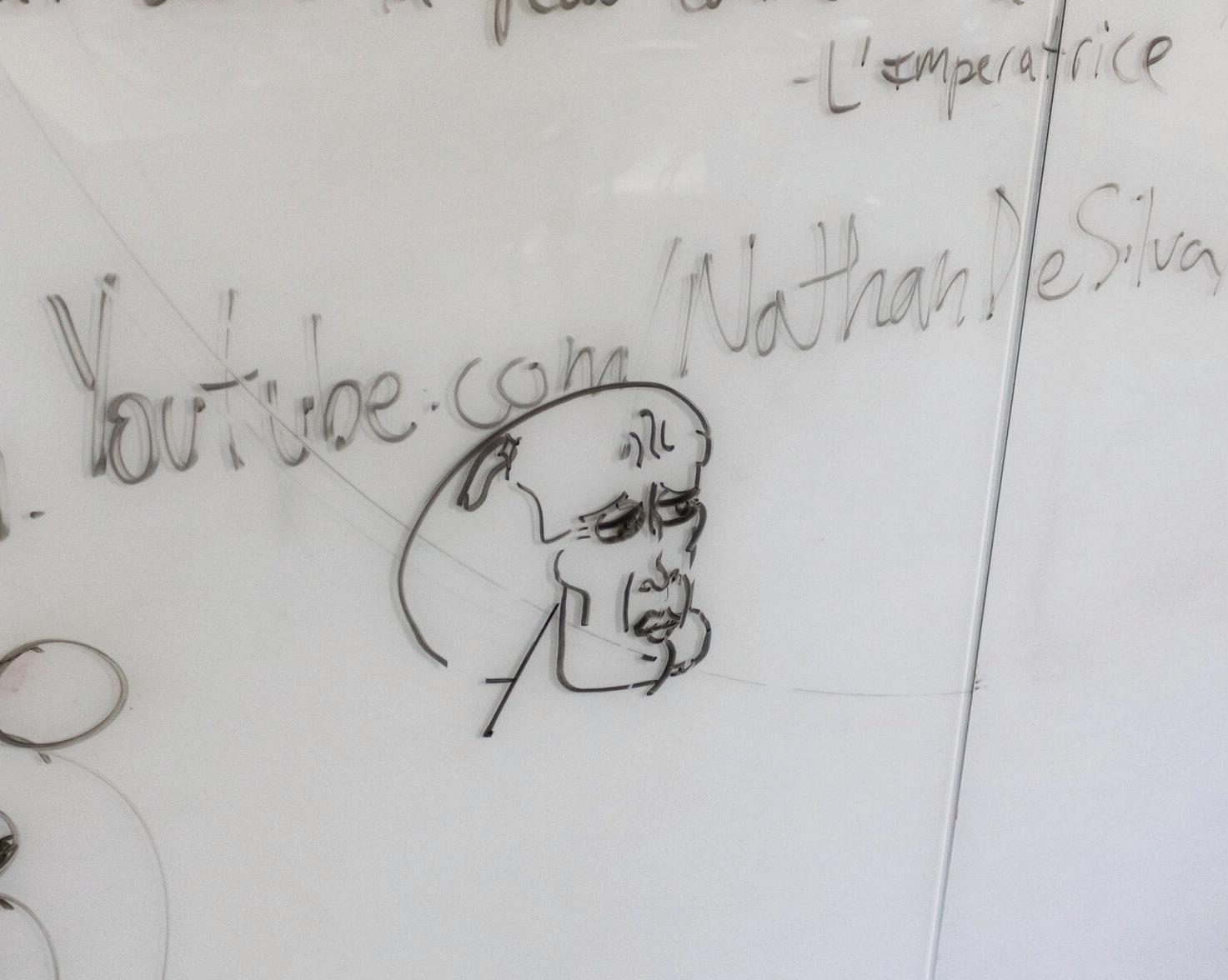








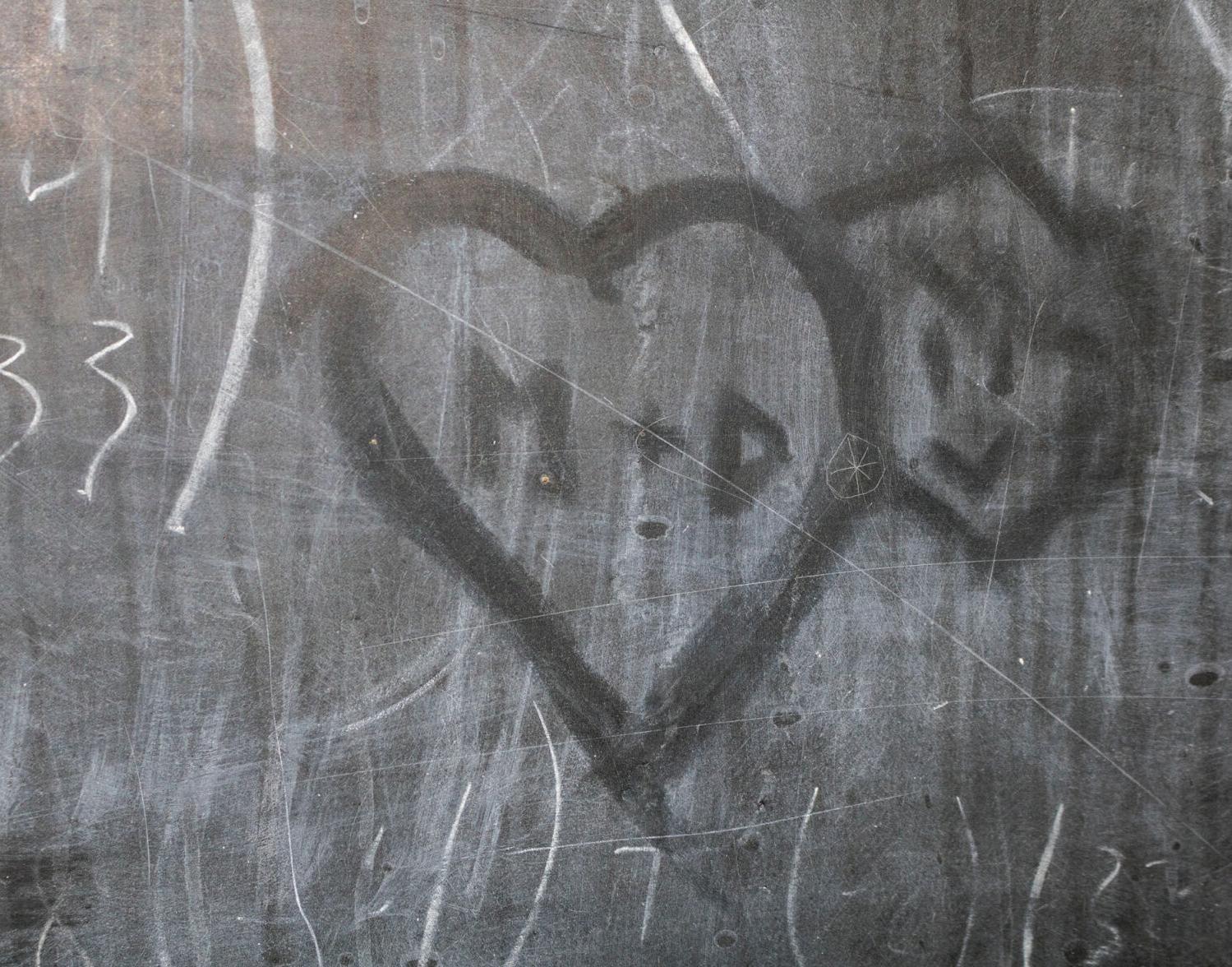

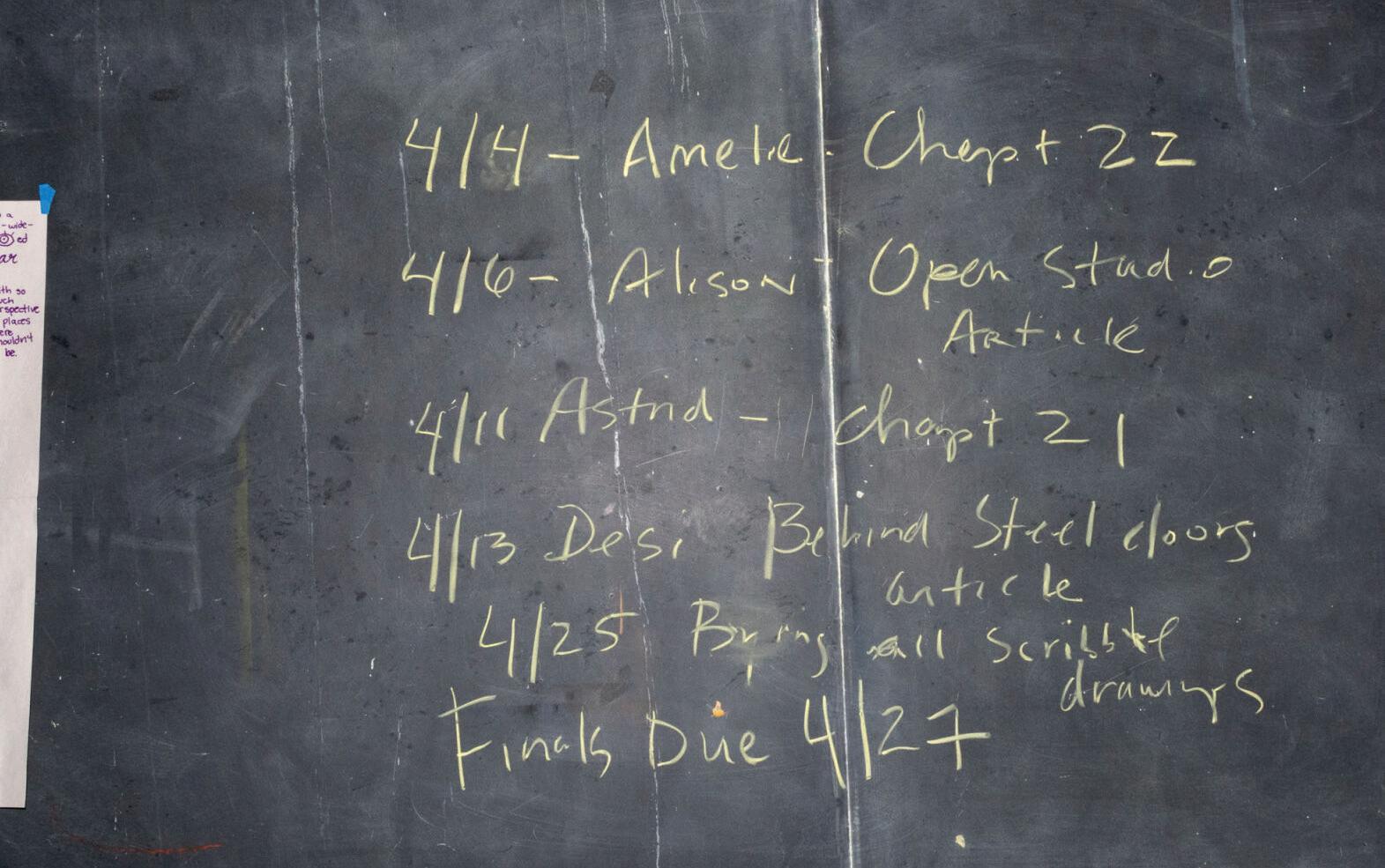

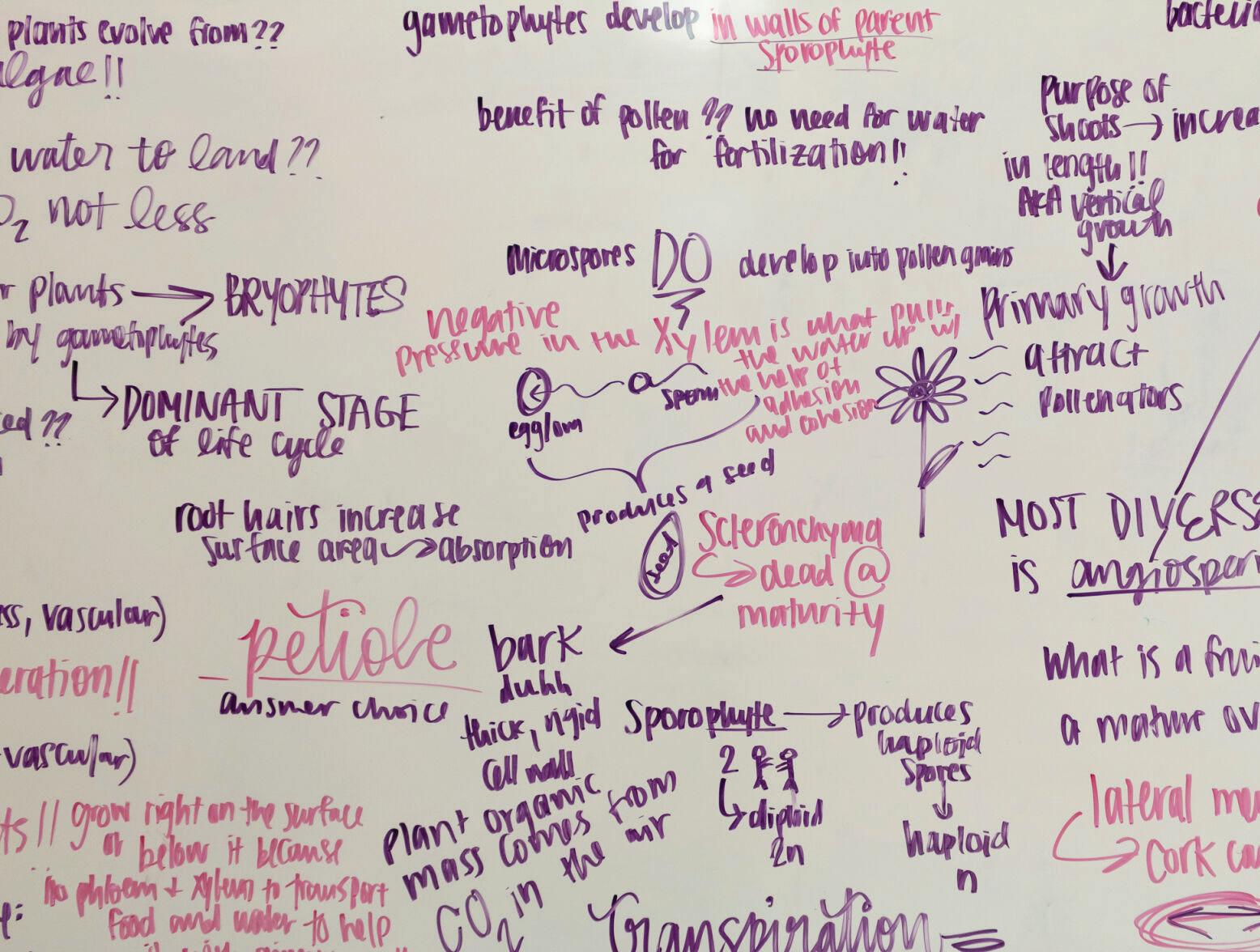

If you’re feeling “board,” take a look at the various doodles and notes left on boards around campus.

No. 1 LSU stared its first SEC series loss of the season in the face Friday afternoon, one that likely would have produced a new No. 1 team to beat in the conference.

Through the first 16 innings of the series, No. 6 South Carolina had outscored the Tigers 20-8 and entered the final stretch of game two with a seemingly insurmountable four-run lead.
But with the bases loaded in the eighth, Gavin Dugas took on the weight of the entire series and delivered a devastating grand slam to tie it at seven heading into the ninth. From there, Cade Beloso and freshman pitcher Gavin Guidry put the finishing touches on their miraculous, series-evening victory.
Celebrations were brief and distracted, as fans awaited the announced fate of the final game. The weather notably picked up towards the end of Friday’s contest, causing Plan B for the series finale to be put into question.
Initially, game three had been
scheduled for Saturday. Then, it was announced that it would be moved up to Friday, making the last two games a double -
header. And with the continued downpour in Columbia following LSU’s game two victory, it was tentatively moved back to Satur-
day. With the forecast for Satur-
LSU women’s basketball has now accepted an invite to the White House, according to the Associated Press.
A day after Angel Reese stated her intentions not to visit the White House, LSU spokesperson Michael Bonnette told the Associated Press that LSU does intend to visit the White House. There is no confirmed date for the visit.
This comes after First Lady Jill Biden initially suggested both LSU and Iowa visit the White House, a notion rejected by players from both LSU and Iowa.
Her invitation was later clarified by the First Lady’s press secretary Vanessa Valdivia.
“The First Lady loved watching the NCAA women’s basketball championship game alongside young student athletes and admires how far women have advanced in sports since the passing of Title IX,” Valdivia said in a tweet. “Her comments in Colo -
see CANCEL, page 10 see ACCEPT, page 10
 BY HENRY HUBER @HenryHuber_
BY HENRY HUBER @HenryHuber_
It seemed like the series was over.
Following a Thursday night outing that would best be described as less than stellar and a slow start for the Tigers in game two, it initially seemed like LSU wasn’t even going to make its series at Founders Park interesting.
South Carolina had previously dominated on both sides of the field on Thursday, where it put up 10 runs following an early departure from Paul Skenes and held the Tigers to one point until the seventh.
And while LSU’s offense did begin to build up some momentum in the last two innings of that game, that fire didn’t carry into the first few innings of game two. The team attributed a single hit through its first three innings, as South Carolina pitcher Jack Mahoney surrendered rare success through the early goings of the game.
On the other side, LSU starting pitcher Ty Floyd wasn’t doing much to alleviate the woes on offense.
He had early struggles with hitting batters and issuing walks,
which reached critical levels in the second inning. In that inning alone, he issued three straight walks before hitting South Carolina’s next two batters to allow two runs without surrendering a hit. That hit would come, though, as a Gamecock double added two more runs to the scoreboard and left them up 4-0 entering the third.
A three-run response off a waning Mahoney and strong defensive showings in the third and fourth inning would temporarily provide Tiger fans with hope, as they were able to narrow the gap to a single point.
But South Carolina responded with the same output in the fifth inning, and following its relief of Jack Mahoney, it would shut down LSU’s offense once again.
Fortunately for LSU, its defense would do the same. The Gamecocks would harbor a 7-3 through the next few innings but notably wouldn’t build on it, as Griffin Herring pitched a strong three innings and its outfield held firm.
That opened the door for what happened in the eighth.
Following an inerrant pitch, a walk and a single from Brayden Jobert, Gavin Dugas went up to

bat with the bases loaded and two outs. What occurred during the remaining at-bats this inning would likely determine the game, as this was likely LSU’s last chance considering how well the Gamecock defense had been playing.
Dugas delivered the best-case
scenario, drilling a home run to left field to give the Tigers a much-needed grand slam. With a tied score entering the bottom of the eighth, all the Tigers had to do from that point on was hold firm and put up one more run.
It would do just that, as a Cade Beloso single allowed Dylan
Crews to score in the top of the ninth and closing pitch Gavin Guidry would get the job done, pitching three strikeouts and allowing just one hit and walk. With its improbable comeback, the Tigers have evened the series and ended South Carolina’s 19-game winning streak at home.
CANCEL, from page 9 day’s weather remaining dire and the NCAA rulebook requiring conference series to take place in a three-day span, it was pretty much guaranteed that the series would be cancelled. The anticipated announcement would come the following morning.
That leaves the world of college baseball with multiple unanswered questions.
Who would have won the series had the finale not been canceled? Which team has the edge at this point in the season? Will this impact next week’s rankings despite it ending in a draw?
We can only speculate on those for now.
You can never count out this LSU squad when it comes to pulling off the improbable, evident based on its previous win. But considering the condition of its bullpen and what the Gamecocks had managed to do to it through two games, projections pointed in their direction when it came to who would take the series.
Chase Shores and Nate Ackenhausen are still out with injuries, each of which currently hold an ERA under 2.00. One of its best relievers in Garrett Edwards was added to that list after exiting game two with an elbow injury.
Couple that with the Tigers delving deep into their bullpen through the first two games and
they didn’t have many available pitchers remaining. Head coach Jay Johnson mentioned Christian Little, Thatcher Hurd, Bryce Collins and Riley Cooper as available pitchers for the finale. Blake Money was likely available as well.
Four of those pitchers have ERAs over 5.00, with Little being the only one to have one under that at 3.63.
Being that the Gamecocks managed multiple earned runs off Paul Skenes, Edwards and Ty Floyd, it isn’t outside the realm of possibility that they could’ve had a field day with that proposed lineup. Not to mention that they were consistently earning free bases, with the LSU pitching staff issuing 16 walks and hitting seven batters to go along with a wild pitch and three errors from the defense.
On the other side of the field, the Tigers were mostly stagnant as well.
They earned one run through the first six innings of each game and Jordan Thompson, Gavin Dugas and Cade Beloso combined for all but one of their RBIs. South Carolina held Dylan Crews, Tre Morgan, Jared Jones and others at bay through much of the series, with Crews being struck out the same number of times he got on base.
That’s not to say the Gamecocks were all-out guaranteed
to dethrone the Tigers or hinder their considerable offense for a third straight game, with the South Carolina bullpen also being in a rough spot. Noah Hall was out with injury and most of its other more involved pitchers were exhausted through the first two games.
They did have more available pitchers with ERAs lower than 3.50, containing one of the deepest bullpens in the country based on overall ERA. But against LSU’s lineup, it typically takes one spark to create an explosion and even the slightest drop in proficiency could’ve spelled doom for them.
I would have given South Carolina the edge based on the facts listed above but we’ll never truly know who ultimately would’ve won the series.
Either way, I wouldn’t say the cancellation was best-case scenario. Each team earned the chance to claim the series with their respective victories and being overly critical of either squad losing wouldn’t have made much sense.
A series loss for LSU wouldn’t have been the end of the world by any means, especially with the number of injuries it currently has. Nobody said winning the SEC was going to be easy, and the Gamecocks proved that they’re about it in terms of competing with the conference’s best.
ACCEPT, from page 9 rado were intended to applaud the historic game and all women athletes. She looks forward to celebrating the LSU Tigers on their championship win at the White House.”
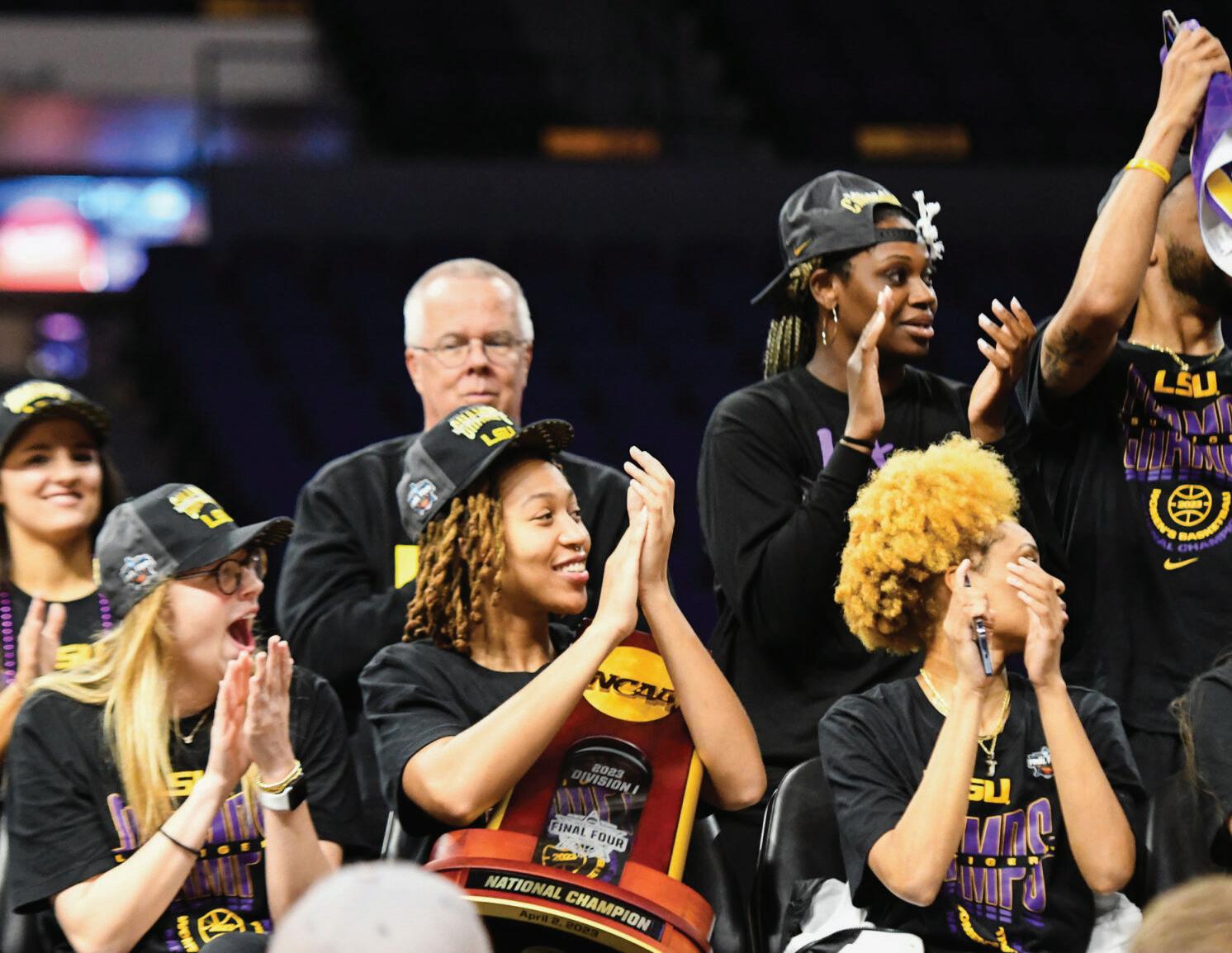

Reese criticized that statement on the “I am Athlete” podcast, suggesting the team visit former president and first lady, Barack and Michelle Obama instead.
Reese did later confirm that she would visit the White House with the team in an interview
with ESPN.
“I’m a team player. I’m gonna do what’s best for the team,” Reese said. “At the beginning we were hurt. It was emotional for all of us because we know how hard we worked all year for everything and just being able to see that [invitation to both teams] hurt us in that moment. But just going back on it, you don’t get that experience ever. And I know my team probably wants to go for sure, and my coaches are supportive of that. I think we’ll all come together, and it will be good.”
An hour south from our newsroom, Loyola University is trying to punish a student journalist for doing her job.
We at the Reveille are no strangers to administrative pushback to our coverage, and we’re appalled to see another university attempting to discipline a student reporter for providing coverage to her community.
Kloe Witt, a journalist for The Maroon, the Loyola student newspaper, went to the university police station in March to report on a student arrested for stalking. She made the trip after a station official told an editor at The Maroon to send a reporter. Witt rang the doorbell and was greeted by an officer and promptly identified herself as a reporter, according to The Maroon.
The police officers seemed more than willing to help Witt with her story – they even offered to make copies of the arrest record
for her and briefed her and an administrator on the arrest.
Witt “visibly began recording” during this briefing, The Maroon reported. Shortly after the meeting, the Loyola administrator who also attended the briefing, Marquita Morgan-Jones, demanded that Witt hand over the documents she had been given and told her to leave immediately.
Eleven days later, Witt was notified by Loyola that she was facing disciplinary charges for an unauthorized recording and falsification or misuse of university records, according to The Maroon.
Witt went to a disciplinary hearing to face three violations; she was found responsible for one, unauthorized recording, and the other two were dismissed. Witt is appealing the finding of responsibility.
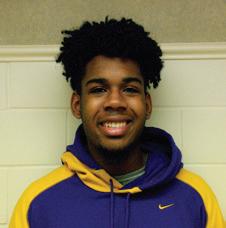
What exactly do university officials think Witt did wrong here? What do they think she should have done differently? It’s unclear,
given that officials have denied opportunities to comment on the matter, according to The Maroon.
Even if it wasn’t clear to the officers in the police station that Witt was recording, there should be no reasonable expectation of privacy in this setting and context. Witt was invited by police officers to a police station to gather information about a crime that took place that night. The notion that the conversation was private is ridiculous.
“I followed every rule and was just doing my job as a journalist,” Witt said in an article by The Maroon. “I was doing that job and doing it right, and I’m still being punished.”
It seems that Loyola administrators are less concerned about the legal underpinnings of this case and more concerned about flexing their control over the student newspaper. The circumstances suggest that an administrator showed up to the police station, felt threatened by the reporter’s presence and
reached for any policy they could use to discipline Witt and send a message to other student reporters.
Loyola’s mission statement is to “pursue truth, wisdom, and virtue; and to work for a more just world,” according to its website. These are worthy goals, but they’re impos-
sible to achieve if school’s leaders are focused on preventing reporters from doing basic news gathering and keeping the community informed.
Loyola administrators should be embarrassed for their blatant disregard of press freedom.

SERIOUSLY KIDDING
FRANK KIDD
@FK446852315
Twitter recently declared it would begin removing the blue check marks from users and businesses that haven’t paid for its new, premium service, Twitter Blue.
The change was supposed to take place on April 1, but the only notable account to lose its legacy verification mark was the New York Times, which expressed its reluctance to pay after the announcement.
So why does this little blue check mark matter? It was originally supposed to denote users or businesses that were verified through Twitter, thus legitimizing the account for other users. If a blue check appeared next to their name, it meant that they really were who they said they were.
By purchasing a check through Twitter Blue, it allows users who shouldn’t be verified to pay and get the verification check – all while previously verified accounts, journalists, brands, etc. lose it.

The decision to remove them likely came from Twitter CEO
EDITORIAL BOARD
Josh Archote Editor-in-Chief Managing Editor Hannah Michel Hanks Claire Sullivan News EditorElon Musk in a move that showcases both the inadequacy of his temperament to handle his platform and that through his pettiness he can occasionally do something funny. The self-proclaimed meme lord is now 1 for 3,000 on his attempts at humor.
But aside from Musk hitting the comedy lottery, his decisions as CEO have imperiled the future of journalism on the platform. The looming removal of blue verification checks would make the task of separating legitimate news from misinformation far
more difficult – especially for users with a low level of media literacy.
That task is made even more difficult by the accounts that have purchased a blue check. These accounts at first glance can appear to be official sources and first glance is enough for some people. If this decision comes to pass it will be easier than ever for a Twitter user to pass off fake information as a reputable news story.
Combine that with the continued improvement of artificial
intelligence’s capabilities and it’s a recipe for the destruction of any shared reality. Twitter will be crawling with deepfake AI videos of Buzz Aldrin saying that the moon landing was fake, Queen Elizabeth II saying that she had Princess Diana killed and George Bush admitting to planning 9/11.
Even elected officials have been fooled by misinformation before; there’s no need to make that problem worse. What will happen when Lauren Bobert accuses Oprah Winfrey of rigging the 2020 presidential election or
claims that left-wing pre-schools are performing mandatory gender confirmation surgeries on every student?
It’s not hard to imagine U.S. Rep. Marjorie Taylor Green of Milledgeville, Georgia, on the floor of Congress accusing President Biden of helping former president Barack Obama hide his true birth certificate while holding up a printout of the supposed authentic version that reads, “Barak Husane Obamna Birthplace: Kenya, Africuh” written in crayon.
To avoid this future, Elon Musk should swallow his pride and return Twitter to how it was before his purchase or sell it. As it stands, it will continue to gradually worsen with every bad decision that Musk makes. He’d be wise to do one of these before his Saudi investors get upset and send henchmen to dangle him off of a balcony demanding their billions of dollars back.
It’s not too late Musk should call off the decision and claim that it was an April Fool’s joke. That would put him at an impressive 2 for 3,002, a huge jump for his joke ratio.
Deputy News Editor Gabby Jimenez John Buzbee Opinion Editor GRAPHIC BY MADDIE FITZMORRISThe Reveille (USPS 145-800) is written, edited and produced solely by students of Louisiana State University. The Reveille is an independent entity of the Office of Student Media within the Manship School of Mass Communication. Signed opinions are those of the author and do not necessarily represent the views of the editor, The Reveille or the university. Letters submitted for publication should be sent via e-mail to editor@lsu.edu or delivered to B-39 Hodges Hall. They must be 400 words or less. Letters must provide a contact phone number for verification purposes, which will not be printed. The Reveille reserves the right to edit letters and guest columns for space consideration while preserving the original intent. The Reveille also reserves the right to reject any letter without notification of the author. Writers must include their full names and phone numbers. The Reveille’s editor in chief, hired every semester by the LSU Student Media Board, has final authority on all editorial decisions.
“News is something someone wants suppressed. Everything else is just advertising.”
Alfred Harmsworth British Lord and Publisher 1865 — 1922
